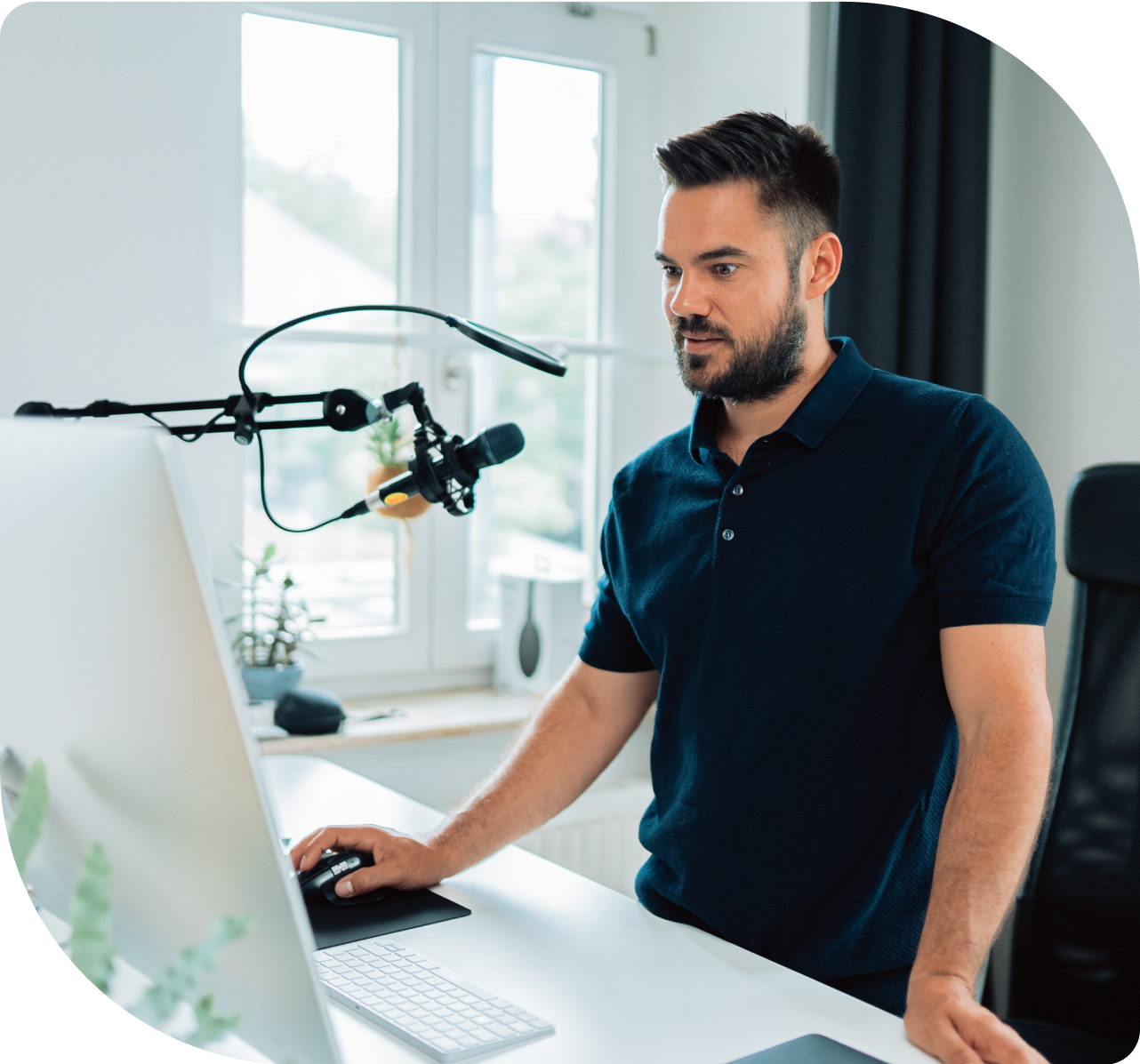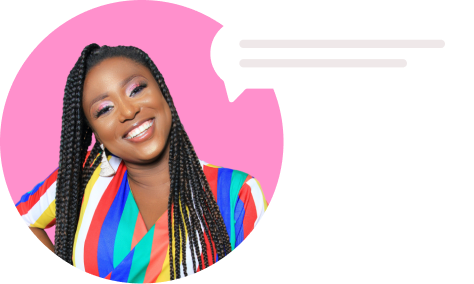How Podcasting Can Take Your Coaching to the Next Level

By Lindsay Harris Friel
Lindsay enjoys helping people find new ways to tell their stories. When she’s not writing for The Podcast Host, she enjoys making audio drama and learning more about the craft of interactive storytelling.
Maybe you’ve started your coaching business, and it’s not growing like you’d hoped. Or, perhaps you’ve been coaching for a while, and things have gotten stale.
If you want to infuse your coaching practice with fresh life, podcasting can help. In this post, I’ll show how coaches and their clients can benefit from podcasting.
Producing a podcast doesn’t have to take up a lot of time and energy. Plus, podcasting can help you to:
reach new prospective clients,
use client time more effectively, and
increase your business's revenue stream.
Podcasting Lets You Tap Into a Whole New Global Client Base
Not only can a podcast validate and strengthen your relationship with your current clients, but also you can reach prospective clients anywhere in the world. The ideas your coaching practice shares are valuable. People search for them in podcast listening apps. Why shouldn’t they find your podcast?
When you share your coaching practice’s focus, you can:
Explore your topic in depth
Build trust and authority
Reach more people, anywhere in the world.
When you go deep on topics, people will seek out your podcast episodes to listen to your research and unique perspective.
For example, let’s say you coach people to help with smoking cessation. You might not have enough time during your client session to explain how peer pressure and media portrayals have made it hard for people to quit smoking.
But, in a podcast, you can explain the history of nicotine marketing going back to 1789. People interested in the deeper challenges of smoking cessation can find your podcast episode when they search for those topics. You can make a good impression on new people, no matter where they are in the world or when they listen.
Podcast audiences often report that they feel as though they have a personal, friendly experience with the podcast host. This familiarity, coupled with the detail and specificity of the episode’s topic, can build trust and authority, and lead to new clients and opportunities.
Podcasting is scalable. You could spend an hour working with one or two people who might recommend you to your friends. Or, you could spend the same time working on a podcast that could reach hundreds of people.
And, even if those podcast listeners don’t sign up for coaching sessions right away, if they like your show, they’ll talk about it and share it with friends.
Podcasting helps you explore concepts, share them, and attract people interested in your ideas. There’s no upper limit on how many people your podcast could reach.
Make Coaching Sessions More Effective By Maximizing Time
Sometimes, your clients have to miss a session but don’t want to lose momentum. Your podcast can validate their actions and strengthen their resolve. When your client returns from their break, they won’t have to catch up and can continue moving forward toward the goals you’ve pursued together.
Or, you may have thoughts about your coaching philosophy that you want to share with all your clients, without taking up time in individual sessions. Some of your coaching practice is repeatable, such as:
affirmations,
hypnotherapy, or
guided meditations.
Either way, your supplementary material can live on in your podcast, while your coaching sessions can focus on what’s most important at that moment.
You Can Sell an Exclusive, Clients-Only Podcast
Your podcast doesn’t have to be available to the general public. Many podcasts have one feed of episodes available for free and another for paid supporters.
Any podcast hosting service will help you create a feed of episodes. But, some hosting services have tools for private podcasts that help you to:
keep that podcast private,
communicate with your paid subscribers, and
remove a user when they’re no longer your client.
Delivering exclusive premium content that helps your coaching clients reach their goals will make them want to recommend you to their friends.
How Hard Is It to Add Podcasting to My Coaching Services?
It’s not hard to make a podcast at all. You might be aware of podcasts like Serial or Radiolab, that use field recording, sound effects, music, and more. But, you can put your voice front and center in a podcast as easily as making a phone call.
Our free guide to starting a podcast provides an overview that takes you, step by step, through every aspect of producing a sustainable podcast. One that won’t take over your entire schedule.
And, Alitu helps you record, edit, and publish your podcast without obstacles. You don’t have to have any specialized knowledge or skills to bring your episodes to life. If you can plan and host a party, you can produce a podcast with Alitu.
If you still feel like you’re in the dark about this podcasting malarky, though, then here’s a whirlwind tour of what you need to know.
An Extra-Simple Guide to Producing a Podcast for Your Coaching Clients
Your coaching practice clarifies why you want to make a podcast, and who it’s for. Write down your “why” and “for whom,” along with a few possible names for your podcast. Make sure the title tells what the show is about. Then, let the tone convey who it’s for.
For example, if you want to attract a buttoned-up client base, you may want to try a descriptive name. But, if your coaching style is more free-spirited, you might want to try something with a pun, a question, or alliteration. Search on Namechk.com or your favorite search engine to find if your preferred name is taken elsewhere before you commit.
You can also get a big helping hand with this stage in the form of the Alitu Showplanner. It’s a tool you can use for free, no signup or login required. Just answer a few questions, and it’ll generate a list of potential names, an elevator pitch, suggested formats, ideal audience profile, a trailer script, and ideas to make your show unique. It’s the perfect tool for pushing past those early podcast planning barriers.
Leaning on this info, decide how frequently you want to release new episodes, how long you want them to be, and what format to use. This shows you how much time you’ll spend on your podcast per week, and what resources you’ll need. For example, an hour-long panel discussion could take much longer to schedule and edit than a fifteen-minute solo episode, which may take more time to script.
Choose whatever feels the most manageable for your life. The “right” kind of podcast to make is the one you can sustain and stay inspired.
Write down 5-10 episode ideas. This can be a sentence for each. A title will do.
Many podcasters shop for podcasting gear before they plan their show. This isn't a great idea. Now that you know, for example, whether your podcast is solo or co-hosted, you’ll know if you need one microphone or two. We have guides for microphones, headphones, computers, and all kinds of gear, to help you narrow down your search and avoid overspending. At a minimum, you’ll need a microphone, a computer, and a good pair of headphones.
You’ll also need a podcast hosting service, to store your audio files and push them out to listening apps and your audience. Our podcast hosting service chooser tool asks a few simple questions about your priorities and the features you need. Then, it narrows down choices to show you the media hosting service that’s a good fit for your podcast.
Software to record and edit your podcast is also necessary. Mac users may have Garageband automatically installed on their computers. Audacity is free and performs the basic functions needed to start your podcast. Adobe Audition, conversely, is a professional digital audio workstation, which comes with a subscription fee. Alitu makes it easy to record and edit a professional-sounding podcast, including transcription and hosting, for one monthly price.
For each of your episodes, write a basic script or outline. If you write a bullet point for each thought you want to convey, your natural speaking voice will sound spontaneous. You don't have to script all of your episode ideas right away. But, the more your podcast ideas are written out, the easier it is to stay consistent with your podcast production schedule.
When you record, use a quiet, well-insulated space. The softer and smaller the environment is, the less your voice will reverberate. A closet, with lots of hanging clothes and sweaters, is ideal. Ira Glass used his closet to record This American Life during the pandemic, and he did just fine.
Editing your podcast episodes can be intimidating, but it doesn’t have to be. Some people love adding sound effects and/or music, balancing the audio levels, and removing background noise. Others find it a chore. If you don’t have a lot of time, there’s no shame in outsourcing the work to a professional editor. Or, use software like Alitu, which polishes your audio for you, automatically.
Cover art is my favorite part of the process. Your cover art needs to be square, no more than 3000 pixels per side, 72 dpi, under 500 KB total, saved as a jpeg or PNG. It can be as small as 1400 pixels per side. Apple Podcasts sets the standard, and currently, their instructions say that bigger is better. The key is ensuring your dots per inch (dpi) equal 72. If all this seems like a lot of information, Canva has a podcast cover art template that you can use for free.
Once you’ve finished editing a couple of episodes, upload them to your chosen hosting provider. Then, send it to as many directories as possible. Or, keep your podcast private, and only share it with your clients.
Grow Your Coaching Practice With Confidence by Producing a Podcast
Many podcasts never make it past the third episode. This usually happens because the podcaster doesn’t know what their podcast is about, or who it’s for. Your coaching practice, however, gives you loads of ideas to research, analyze, and share, around the hub of your mentoring philosophy. Plus, your coaching practice gives you an ideal listener to keep in mind. This focus makes your podcast more meaningful and helps your coaching practice grow.
You already have a unique perspective, motivational skills, and a wealth of knowledge. Put your coaching practice on a global stage by making a podcast. And remember, you can get instant feedback, ideas, and suggestions for your podcast for free with the Alitu Showplanner. No sign up or login required!



